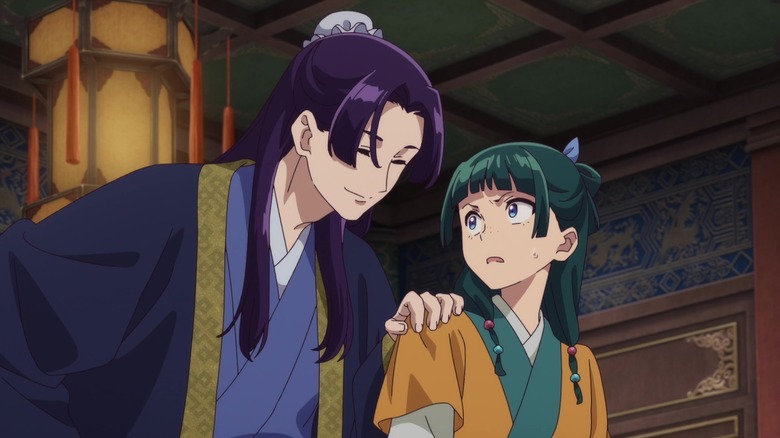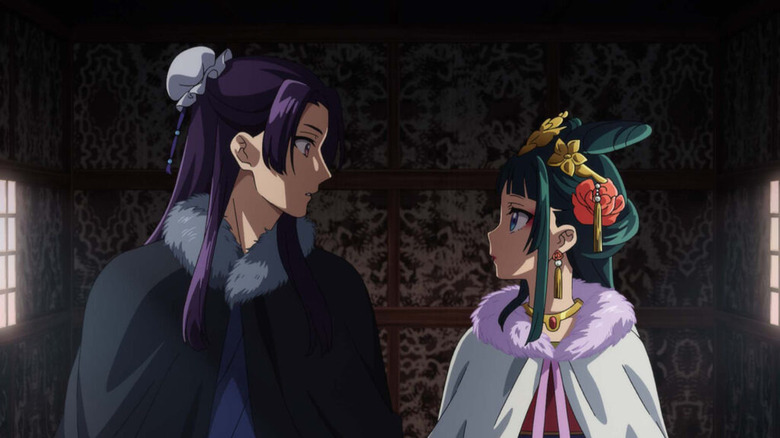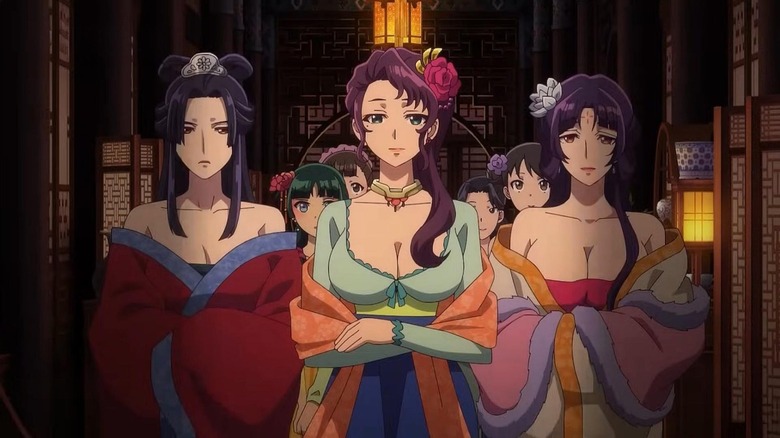This Awesome Anime Is A Medieval Blend Of Sherlock Holmes And House
(Welcome to Ani-time Ani-where, a regular column dedicated to helping the uninitiated understand and appreciate the world of anime.)
Episodic storytelling is a lost art. That is, knowing how to craft a compelling standalone episode of television you can watch on its own and get a complete story out of while still dropping enough character work and lore to carry the story from one episode to the next (and even into future seasons).
Granted, there are still exceptions that carry on this tradition, like the excellent anime spy sitcom "Spy x Family." Now comes an anime that delivers on the procedural genre, with a mix of "House M.D." and "Sherlock Holmes" set in medieval China that is equal parts thrilling, mysterious, and fun.
"The Apothecary Diaries" follows Maomao, a young girl living in a fictionalized version of Imperial China who works as an apothecary in the red-light district. After she is kidnapped and sold as a servant, she comes to the Imperial Palace where she becomes a lady-in-waiting and poison tester to one of the Emperor's concubines. Though she would much rather live a quiet life where she can taste new poisons and medicines at will, Maomao's curiosity and intellect inadvertently place her in the middle of palace intrigue until she becomes an unofficial forensic pathologist.
From there, the show becomes an intriguing anime that delivers thrilling case-of-the-week stories while slowly unraveling a web of conspiracies and drama within the palace — all carried by one of the best anime protagonists in a while. This is one of the best anime titles of 2023 and one that both newcomers and longtime fans can enjoy.
What makes it great
"The Apothecary Diaries" excels at telling compelling episodic stories that expand Maomao's world. There are episodes about a poisoned minister, a courtesan and a customer being poisoned, a concubine getting poisoned via arsenic-based makeup (there is a lot of poisoning on this show!), a bureaucrat falling into a coma due to his pufferfish being tampered with, and much more. The big joy of watching this series is the combination of Maomao's medieval Sherlock Holmes shtick with the historical setting.
Admittedly, this means most of the solutions to the show's mysteries are rather obvious if you have even a passing knowledge of biology and poisons (for instance, if you know that arsenic-based makeup is a horrible idea). Maomao is not a superhero and does not possess superhuman intelligence, but she has learned enough at a time when knowledge was limited to a few (more on this later) that she easily solves what appear to be unsolvable enigmas. What a room full of old bureaucrats or ladies-in-waiting may assume is a curse ends up being just a simple illness overblown due to ignorance and superstition.
It helps that Maomao is one of the best anime leads we've seen in a while, a sharp and funny character who knows when she's right and doesn't just shut up and let others waste time when she has the answers. Plus, having a hero who is utterly and ridiculously exhilarated by poisons is just funny.
Like the best procedurals, "The Apothecary Diaries" still manages to add breadcrumbs throughout the season that slowly build up into a compelling overarching story, dropping hints about life at the palace to tease soapy melodrama involving babies being switched at birth, surprise fathers showing up, and more.
What it adds to the conversation
What makes "The Apothecary Diaries" more than just a fun procedural is the way that the show never lets you forget that despite the luxury of the palace, and how nice the characters may seem or how much they like Maomao, its protagonist is still very much expendable. Every character, from the lowest servant to the highest official, is still a cog in an oppressive machine that treats people (particularly women) as property that can be executed at a moment's notice.
Maomao is fully aware of this, which makes her reluctance to get involved in any situation that may make her someone of note funny and also deeply relatable. Her dry humor is clearly a coping mechanism for constantly being on the edge, knowing how fragile her status is.
Indeed, "The Apothecary Diaries" excels at bringing the fragility of status to the forefront at every opportunity. In one of the later episodes, we meet a palace worker who says his family used to be the official purveyor of paper in the palace and enjoyed great wealth — until the previous emperor's mother banned tree cutting on a whim, causing the family to lose everything.
Like "One Piece," the worldbuilding here happens organically in the background. A concubine leaves the palace while a new one joins to replace her, assassination attempts change the face of the palace, and officials rise and fall all the time. The world around Maomao feels lived-in and tangible, with actual change and progression — we just don't see it immediately, given that we're following a lowly apothecary.
Why non-anime fans should check it out
Working together on "The Apothecary Diaries," Toho Animation Studio and OLM craft a visually stunning adaptation that brings a procedural mystery to a compelling historical period, delivering entertaining standalone mysteries while still progressing an overarching story and slowly expanding and changing the larger world. Maomao is one hell of an anime protagonist, curious to a fault, witty, and full of life. Add in an excellent score that includes work from "Made in Abyss" star composer Kevin Penkin, and you've got a wholly unique show.
Still, "The Apothecary Diaries" has enough echoes of familiar titles ("House M.D.") to appeal to newcomers while also having distinct characters and a unique setting to appeal to longtime anime fans looking for something fresh that doesn't involve shonen tournament arcs. With season 2 announced right at the end of the first season, this is the best time to catch up on Maomao and her palace shenanigans.
Watch This If You Like: "House M.D.," "Sherlock," "Upstairs, Downstairs."
"The Apothecary Diaries" is streaming on Crunchyroll.



